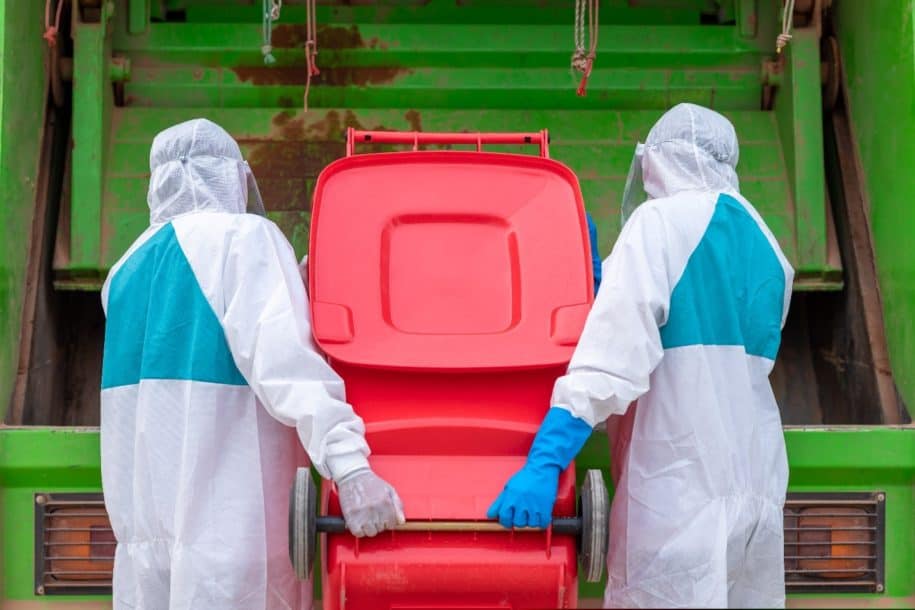Introduction
In the fast-paced world of healthcare, the proper disposal of medical waste is of utmost importance. Medical waste poses significant risks to public health and the environment if not handled and disposed of correctly. Regulatory compliance plays a crucial role in ensuring that medical waste is managed safely and responsibly.
This ultimate guide aims to provide a comprehensive overview of regulatory compliance in medical waste disposal in New York. From understanding the regulations to finding the best waste management service, this guide has you covered.
The Importance of Regulatory Compliance in Medical Waste Disposal
Medical waste includes a wide range of materials, including sharps, infectious materials, pharmaceuticals, and hazardous chemicals. Improper handling and disposal of these wastes can lead to serious consequences such as contamination, infection, and environmental pollution.
Regulatory compliance ensures that healthcare facilities adhere to strict guidelines and protocols for the safe collection, transportation, treatment, and disposal of medical waste. By complying with these regulations, healthcare providers can protect their staff, patients, and the community from potential harm.
Understanding the Regulations
New York State Department of Health Regulations
The New York State Department of Health (NYSDOH) regulates medical waste management through its Part 70 regulations. These regulations establish standards for handling, packaging, labeling, transportation, storage, treatment, and disposal of medical waste.
Under these regulations, healthcare facilities are required to develop comprehensive medical waste management plans and maintain records documenting their compliance with the regulations.
Occupational Safety and Health Administration (OSHA) Standards
OSHA also sets standards for the safe handling and disposal of medical waste. These standards aim to protect healthcare workers from exposure to infectious materials and other hazards associated with medical waste.
Healthcare facilities must comply with OSHA's Bloodborne Pathogens Standard and Hazard Communication Standard when managing medical waste.
Environmental Protection Agency (EPA) Requirements
The EPA regulates the disposal of hazardous waste, including certain types of medical waste. Healthcare facilities generating hazardous medical waste must comply with the Resource Conservation and Recovery Act (RCRA) regulations.
These regulations require proper identification, segregation, labeling, and storage of hazardous waste prior to transportation to a licensed treatment or disposal facility.
Best Waste Management Service in NY
Choosing the right waste management service provider is crucial for ensuring regulatory compliance in medical waste disposal. Here are some factors to consider when selecting a waste management service in New York:
Experience and Expertise
Look for a waste management company with extensive experience in handling medical waste. They should have a deep understanding of the regulations and possess the expertise to handle different types of medical waste safely.
Compliance Services
A reputable waste management service should offer comprehensive compliance services, including training programs, regulatory audits, and assistance with developing medical waste management plans. These services can help healthcare facilities stay up-to-date with the latest regulations and maintain compliance.
Proper Licensing and Certifications
Ensure that the waste management service provider holds all necessary licenses and certifications required by federal, state, and local authorities. This demonstrates their commitment to operating within the regulations and providing reliable services.
Reliable Transportation and Disposal
Check if the waste management company has a fleet of properly equipped vehicles for transporting medical waste. Additionally, they should have partnerships with licensed treatment or disposal facilities to ensure proper disposal of the collected waste.

Environmental Sustainability
Sustainability is an important consideration when choosing a waste management service. Look for providers that prioritize recycling and environmentally friendly disposal methods whenever possible.
Hazardous Waste Disposal Service in New York
Hazardous medical waste requires special handling and disposal due to its potential risks to public health and the environment. Healthcare facilities generating hazardous waste must follow specific protocols to ensure safe and compliant disposal.
Proper Segregation and Packaging
Hazardous medical waste should be segregated from other types of waste and placed in leak-proof, puncture-resistant containers. The containers should be properly labeled and securely closed to prevent any leakage during transportation.
Transportation by Licensed Carriers
Transportation of hazardous medical waste must be carried out by licensed carriers who follow strict protocols for handling and transporting hazardous materials. These carriers have the necessary expertise and equipment to ensure safe transportation.
Treatment at Licensed Facilities
Hazardous medical waste must be treated at licensed facilities capable of handling hazardous materials. Treatment methods may include incineration, autoclaving, or chemical treatment, depending on the type of waste.
New York Medical Waste Disposal
Proper disposal of medical waste is crucial to protect public health and the environment. New York has specific regulations and requirements for medical waste disposal that healthcare facilities must adhere to.
On-Site Treatment Options
Some healthcare facilities in New York may have the option to treat their medical waste on-site using approved treatment technologies. On-site treatment can help minimize transportation costs and reduce the risk associated with off-site transportation.
Off-Site Treatment Facilities
For healthcare facilities without on-site treatment capabilities, off-site treatment facilities provide a safe and compliant option for medical waste disposal. These facilities are equipped with specialized equipment and trained personnel to handle different types of medical waste.
Secure Destruction of Pharmaceuticals
Proper disposal of pharmaceutical waste is essential to prevent environmental contamination and potential misuse. Healthcare facilities must ensure that pharmaceuticals are securely destroyed or disposed of in accordance with federal, state, and local regulations.

Pharmaceutical Waste Management
Pharmaceutical waste management involves the proper handling, storage, transportation, treatment, and disposal of expired or unwanted medications. It is essential to prevent these medications from entering the environment or falling into the wrong hands.
Segregation and Identification
Healthcare facilities should implement a system for segregating pharmaceutical waste from other types of medical waste. Proper identification is crucial to ensure that pharmaceutical waste is treated and disposed of correctly.
Take-Back Programs
Participating in pharmaceutical take-back programs is an effective way to dispose of expired or unwanted medications. These programs allow individuals to safely and responsibly dispose of pharmaceuticals at designated collection sites.
Reverse Distribution
Reverse distribution involves returning unused or expired pharmaceuticals to the manufacturer or authorized distributor for proper disposal. This process ensures that pharmaceuticals are handled by licensed entities and disposed of according to regulations.
Medical Waste Disposal and Compliance Services
To maintain regulatory compliance in medical waste disposal, healthcare facilities can benefit from partnering with waste management service providers that offer comprehensive compliance services. Hazardous Waste These services can help healthcare facilities navigate the complex regulatory landscape and ensure adherence to all applicable regulations.
Training and Education Programs
Comprehensive training and education programs can help healthcare staff understand the importance of regulatory compliance and develop the necessary skills for proper medical waste management. These programs should cover topics such as segregation, packaging, labeling, and documentation requirements.
Regulatory Audits and Inspections
Regular regulatory audits and inspections are essential for identifying any non-compliance issues and implementing corrective actions promptly. Working with a waste management service provider that offers audit services can help healthcare facilities stay prepared for inspections.
Development of Medical Waste Management Plans
A well-developed medical waste management plan is a crucial component of regulatory compliance. Waste management service providers can assist healthcare facilities in developing customized plans that address specific needs and comply with all applicable regulations.
FAQs
Q: What is medical waste? A: Medical waste refers to any waste generated during the diagnosis, treatment, or immunization of humans or animals. It includes sharps, infectious materials, pharmaceuticals, and hazardous chemicals.
Q: Why is regulatory compliance important in medical waste disposal? A: Regulatory compliance ensures that medical waste is managed safely and responsibly, protecting public health, the environment, and healthcare workers from potential harm.
Q: What are the consequences of non-compliance with medical waste disposal regulations? A: Non-compliance can result in fines, legal penalties, reputational damage, increased risk of infections or injuries, and environmental pollution.
Q: How can healthcare facilities ensure compliance with medical waste disposal regulations? A: Healthcare facilities can ensure compliance by developing comprehensive medical waste management plans, providing staff training, conducting regular audits, and partnering with reputable waste management service providers.
Q: What are the different types of medical waste treatment methods? A: Medical waste treatment methods include incineration, autoclaving (steam sterilization), chemical treatment, and landfilling (for non-hazardous waste).
Q: How can healthcare facilities dispose of expired or unwanted medications safely? A: Healthcare facilities can participate in pharmaceutical take-back programs or utilize reverse distribution services to safely dispose of expired or unwanted medications.
Conclusion
Regulatory compliance in medical waste disposal is a critical aspect of healthcare operations. By understanding and adhering to the regulations set forth by the NYSDOH, OSHA, and EPA, healthcare facilities can ensure the safe and responsible handling of medical waste.
Choosing a reliable waste management service provider that offers comprehensive compliance services is essential for maintaining regulatory compliance. With proper training, audits, and assistance in developing medical waste management plans, healthcare facilities can navigate the complex regulatory landscape with confidence.
Remember that the proper disposal of medical waste is not only a legal obligation but also a moral responsibility to protect public health and preserve the environment for future generations.